The puck stopped here
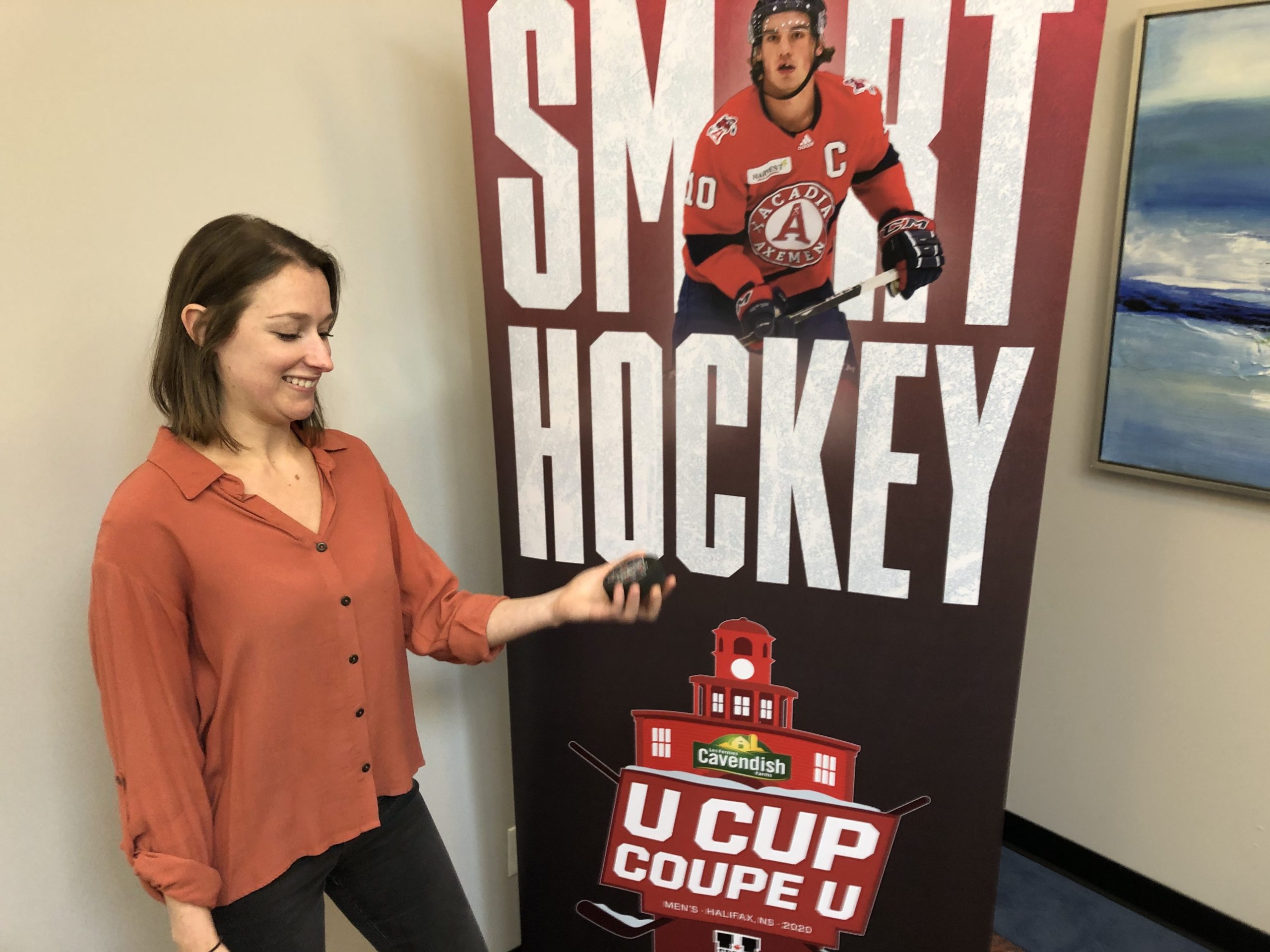
caption
The people, planning and pressure behind the national tournament that almost was
Despite working with sporting events, Rhéa Koivu isn’t a sports fan. She doesn’t follow stats or standings and doesn’t watch games. “The refs have it handled. I don’t have to worry about that,” Koivu says. “Tell me who’s coming and I will make sure everything runs well. People are like, ‘who is this girl?’ But now I’m an expert in all sports.”
Koivu is the manager of business operations at Sports & Entertainment Atlantic in Halifax. Her latest project was the Canadian men’s hockey championship, the University Cup, March 12-15 at the Scotiabank Centre. Eight teams qualified, stretching across the country from Saint Mary’s to UBC.
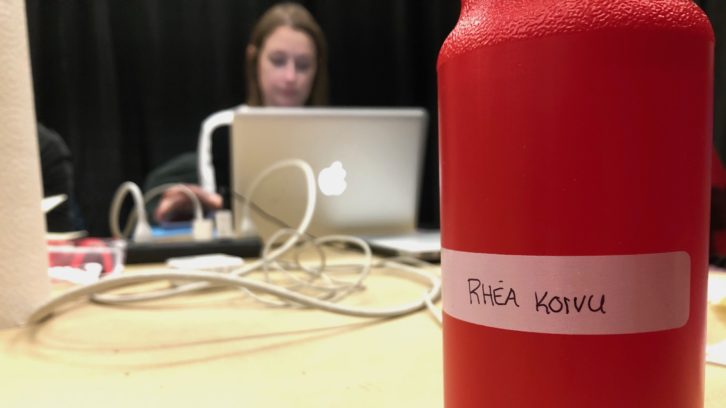
caption
Rhéa Koivu woking behind the scenes at the University Cup.
Here are some of the things Rhéa Koivu had to do leading up to the University Cup. She created a site plan, mapping out dressing rooms, the media centre, VIP lounge and more. She helped design and order ice logos and rink board advertisements. She coordinated catering, dozens of sponsors, and some 200 volunteers. She sourced equipment like pucks, signage, computer paper for the media room, gifts for players and shirts for volunteers. Koivu also created promotional billboards and advertisements to draw in a crowd, and programs for when they arrived.
She could be described as an event manager, but linchpin or keystone is more accurate. She has a bachelor’s degree in business administration from St. FX and an event marketing certificate from Seneca College. Her first job out of school was marketing for Tennis Canada’s Rogers Cup. The T1 Agency in Toronto was Koivu’s next stop, coordinating ParticipACTION events across the country for Canada’s 150th anniversary. The T1 Agency told Sports & Entertainment Atlantic president Chris Larsen that an employee from Dartmouth wanted to move back home.
Larsen met Koivu at a Starbucks. “Within five minutes I’m going, ‘oh my God I gotta get her, we need this person’,” Larsen said. Koivu joined the company as a volunteer and in four weeks was running tournament operations. Larsen was impressed with her experience, given that she’s only 27. He calls her “really well rooted and well grounded. With her it’s all about keeping the wheels moving.”
Koivu oversaw the setup of the Wanderers Grounds for the Canadian Premier League soccer team HFX Wanderers, and has produced golf tournaments, international soccer and rugby matches and national tournaments for university sports. Until the recent men’s national hockey championship, though, she had never faced a logistical problem like the one that was heading her way.
The last meeting
Rhéa Koivu brings a vegetable and fruit tray into the conference room and joins president Chris Larsen at the head of the table. Before she has a chance to sit, the six Organizing Committee volunteers at the meeting, mostly older men, dig into the food.
Meetings like this started taking place each month in the fall; biweekly meetings started in January. Amid the crunching of celery and hands reaching for fruit dip, Koivu begins. On the agenda: access passes and any issues the volunteers need to deal with before the start of the tournament.
When she speaks her words carry authority. The volunteers listen. Koivu has a good rapport with the volunteers; they worked together at last year’s national university final 8 basketball tournament. The volunteers ask her streams of questions, everything from the ripeness of bananas to parking access for medical teams. She responds to quips (and the occasional dad joke) with wit, and answers questions instantaneously, hardly needing to think.
She is attentive, like a great teacher fielding questions from a class. Koivu takes notes on her meeting agenda sheet, her gold X ring dancing above the page in concert with a matching gold pen. She is clearly in a leadership role, but doesn’t carry with it any sense of arrogance.
It is no surprise that Koivu is respected by volunteers and valued by her company. Talking with her, one gets the sense she has a handle on everything. Her desk is devoid of personal effects, ruled instead by a controlled chaos of paperwork and sticky notes. Task-oriented, organized and meticulous, she is the straw that stirs the drink.
Thousands of details
Less than a week before the first puck drop, logistics and the little things became larger chores. This is what was keeping Koivu up at night: finding a video camera with the lens needed for teams to be given game film, assembling all cords and A/V equipment, collecting supplies ranging from scissors to the 10 cases of trophies for Wednesday’s awards gala, accreditation, signage, and figuring out the Western University Mustangs’ practice time contingent on when the team books a flight. “Other than that,” she said with a pause, “we are good.”
In the days before the tournament, sleep was elusive. “When you lie down there are a million things running through your head,” she said. “I have to get up and take notes.”
When Koivu checks her inbox she consistently has at least 60 new emails. Staging a major production like a national hockey tournament includes hundreds of moving pieces and thousands of details. Once the tournament starts, her work shifts. “My job during the tournament is to wait for fires,” she said, “and put them out.”
“It looks smooth, that’s the trick. It’s never smooth.”Rhéa Koivu
Tuesday, March 10 was move-in day. Fittingly, Koivu’s headquarters in the Scotiabank Centre would, once the tournament started, become the VIP lounge. Without throngs of hockey fans, the room had a skeletal ambiance. The modern, monochromatic furniture included a central bar table occupied by Koivu’s laptop and a cup of coffee. A TV on the wall showed sports highlights.
Koivu wasn’t watching, of course: she was busy replying to emails. Volunteers peeked into the room every couple of minutes, hoping to ask a question. Koivu would soon be up walking around, checking in on the volunteers and arena staff. She was in charge, and often gave orders, but people like working for her – in part because she is not domineering. After hauling around a water cooler she said, “I feel so guilty asking people to do something I could be doing.”
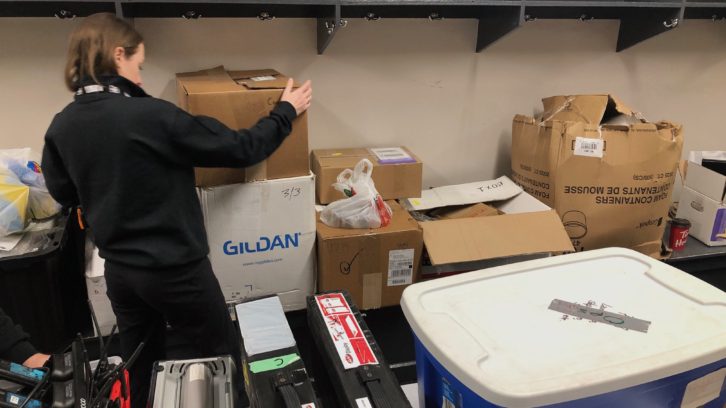
caption
Rhéa Koivu looks at supplies in a dressing room on move-in day.Move-in day was not without its hiccups. In the morning alone Koivu had to deal with fridges, tickets, trophies, VIP passes, dressing rooms, airport pickups, water jugs, fencing and team rooms. The dressing rooms’ mugginess and lack of ventilation was met with an exclamatory “holy hotness!” from Koivu, and a pledge to install fans.
On March 7, five days before the University Cup was to begin, news came that the International Ice Hockey Federation had cancelled the women’s world championship scheduled to begin on March 31 in Halifax and Truro. The reason: COVID-19. Koivu wasn’t fazed by the news.
In case any players expressed symptoms, though, she had to create quarantine rooms – by sacrificing a storage area. “I mean, I hope we get through the week and nothing happens,” Koivu said, with a hint of a nervous laugh. “Usually laundry is our big headache. This year it’s coronavirus, and making sure we have the right lines of communication if people do start getting sick.”
On March 11, the night before the first University Cup game, the NBA announced it would postpone its season.
Small fires
On March 11 the University Cup men’s hockey tournament was ready to start. With the game between the #2 Saskatchewan Huskies and #7 Western Mustangs and just minutes away, Koivu walked a lap of the arena, checking to make sure programs and 50/50 tickets were in the right locations. If she was tired from a lack of sleep, or from four hours on the phone that morning with public health authorities and U Sports officials about COVID-19, it didn’t show. “Other than that, we are cruising,” she said with enthusiasm.
Months of preparation gave the operation a feeling of a complicated, yet well-oiled machine. “It looks smooth, that’s the trick,” said Koivu. She wanted the athletes and fans to enjoy themselves, to not see all of the work that goes into creating that enjoyment. “It’s never smooth.”
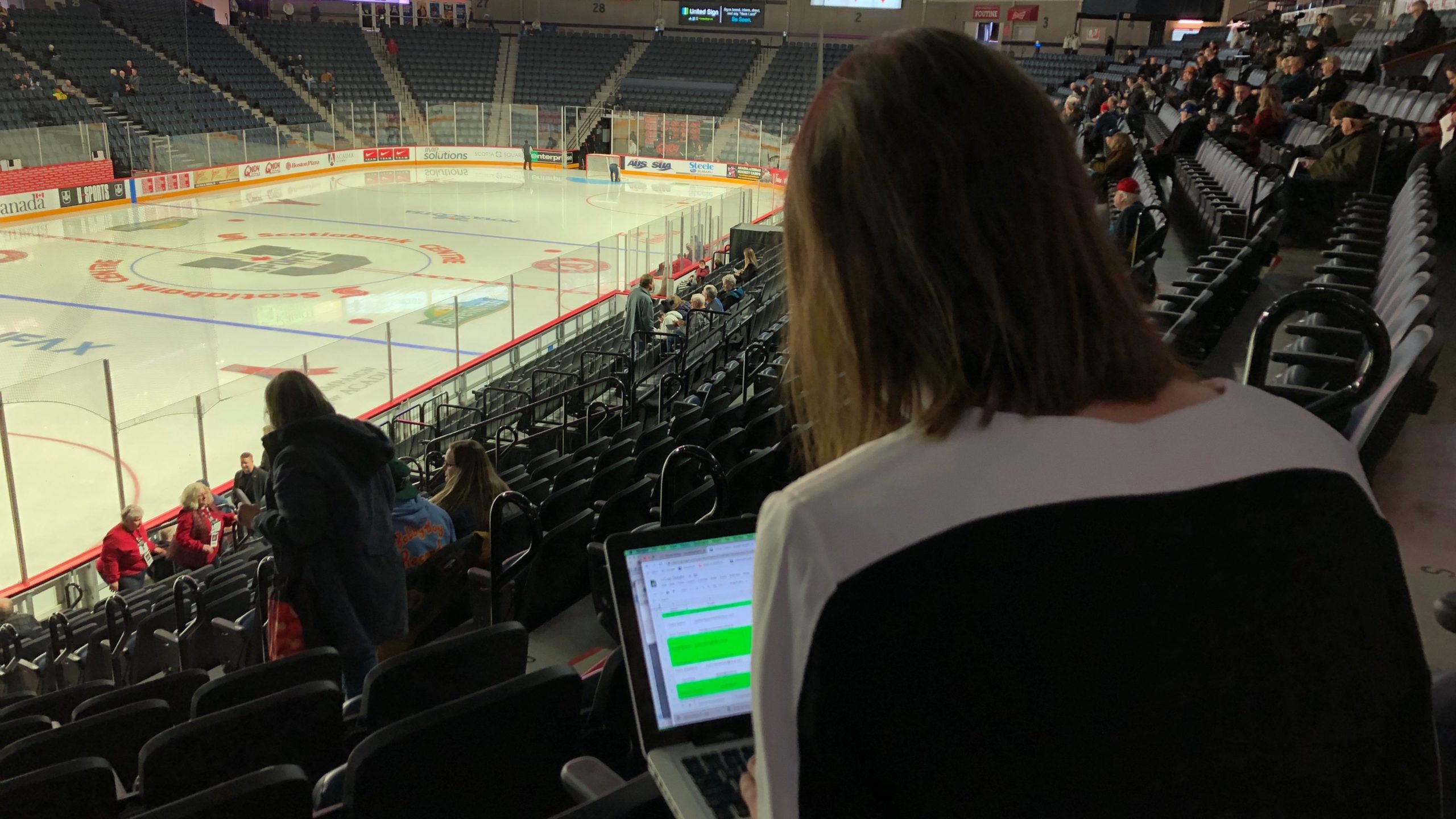
caption
Before the puck drops, Rhéa Koivu catches up on emails.There were still small fires to be put out. The anthem singer at the first game did not sing a bilingual version. Empty promotional pizza boxes intended for fans were in the wrong place and almost thrown out. The volunteer centre was stocked with too many Subway sandwiches. Koivu was relentless, pausing for only the fleetest of moments to eat a muffin.
During that first game the NHL announced it would postpone its season. Also during that game, which Western won in a 3-2 upset, a rash of closures and cancellations affected leagues and tournaments across North America.
Koivu and the organizers discussed how to proceed. The atmosphere was tense, like a hospital room where the doctors are unsure if a patient will live or die. Koivu’s calm and rational presence was a steadying force. Based on recommendations from experts, it was decided to continue with the tournament, for now. This was announced to the media at a news conference.
Afterwards Koivu was relieved to simply move onto the next thing. In her business there is no shortage of next things.
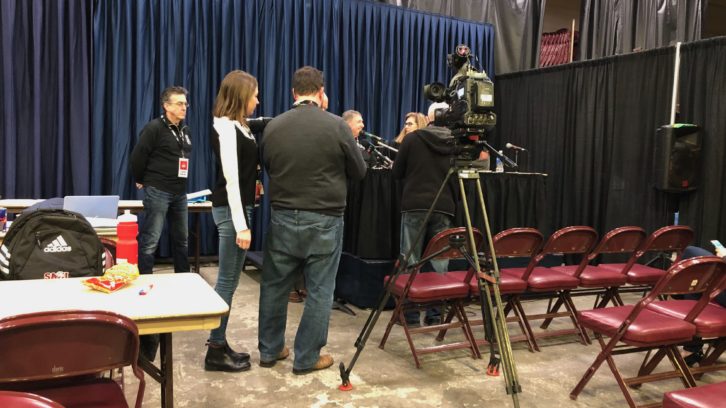
caption
Rhéa Koivu helps set up the between-games COVID-19 media conference.The coronavirus problem would prove too large to overcome. During the second game Hockey Canada decided to cancel all of its activities, leaving Koivu and organizers no choice but to call off the University Cup. For the first time in its 58-year history, the cup would not be awarded.
Ending the tournament after the first day left Koivu feeling teased. She was sad, but there was no time to dwell on her emotions. She had to plan the communications to let the teams and public know.
She broke the bad news to the coaches at the Marriott hotel. The room was sombre. “Everyone was just heartbroken,” she said. “Some of them were crying.” Koivu was mentally exhausted and disappointed for the 200 or so volunteers who had put in so much work. With many being over 65, though, she thought that ending the tournament early was the right choice.
At 1 a.m. that night, before going home, she contacted all of the suppliers and hotels. She was back early in the morning, with the volunteers, moving everything out of the arena. When that was done, Rhéa Koivu went home and slept – except for a short burst of wakefulness in the middle – for nearly 14 hours.
About the author
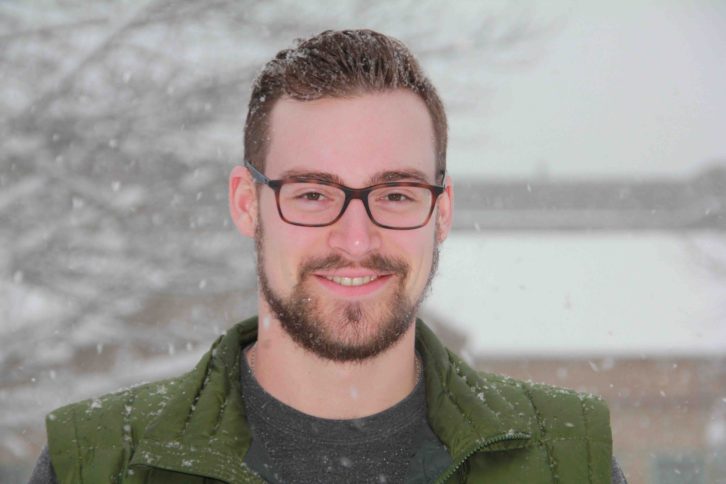
Ben Bogstie
...